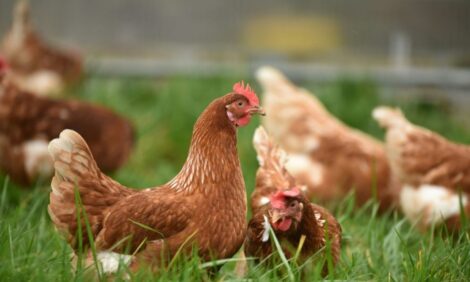



Weekly protein digest: ASF in Dominican Republic, food inflation, USMCA concerns
Market analyst Jim Wyckoff shares highlights from the global protein marketUSDA confirms ASF in Dominican Republic
USDA has confirmed African Swine Fever (ASF) in samples from pigs in the Dominican Republic via a cooperative surveillance program, USDA announced Wednesday. According to the Animal and Plant Health Inspection Service (APHIS), pork and pork products are already banned from entering the U.S. due to restrictions linked to classical swine fever, and the Department of Homeland Security’s Customs and Border Protection (CBP) is “increasing inspections of flights from the Dominican Republic to ensure travelers do not bring prohibited products” into the U.S. APHIS also said that CBP will also be “ensuring that garbage from these airplanes are properly disposed of to prevent the transmission of ASF.” USDA said it has offered more testing support and will consult with the country on any additional steps of actions to “support response and mitigation measures.” USDA has offered similar help to Haiti, which shares a border with the Dominican Republic.
USDA secretary predicts moderation in food inflation
USDA Secretary Tom Vilsack predicted the jump in US food prices in June will quickly moderate despite rising concern about inflationary risks in the economy. “There are certain selective items in the grocery store folks may see for a period of time increased costs,” Vilsack said last Friday in an interview on Bloomberg Television’s Balance of Power with David Westin. “We think this will even out as we begin to recover, as we begin to get the supply and demand in better balance.”
US food prices jumped 0.8% in June from May, double the pace of the prior two months. Meat and poultry prices surged 2.5% last month, according to the US Department of Labor’s consumer price index. Still, food costs are up just 2.4% from a year earlier, while overall inflation was 5.4% for the period.
Vilsack also said USDA would soon announce proposed regulations to provide more protection to livestock producers in their dealings with the highly consolidated meatpacking industry. President Joe Biden’s executive order on competition instructed the USDA to consider stronger regulations. “I think we will see significant action on that in the very near term,” Vilsack told Bloomberg Television.
China still working to stabilize hog prices
China’s cabinet on Wednesday said it would step-up emergency adjustments of its pork reserves and take steps to stabilize hog prices, according to state media reports cited by Reuters. A surge in marketing of heavy hogs late-winter and into spring caused Chinese hog and pork prices to tank, raising concerns about producer margins and their ability to remain in business. The country is still working to rebuild its hog herd after ASF and to control the virus. Recent flooding in key producing areas has added to concerns about producers’ ability to stay in business as well as the spread of disease.
Canada dairy, Mexico biotech issues key concerns after the first year of USMCA
Canada’s inadequate implementation of new market access for US dairy, Mexico’s foot-dragging on ag biotech approvals, and the lack of a chief ag negotiator nominee were some of the key ag-related issues that surfaced during a Senate Finance Committee hearing Tuesday (July 27) held to mark the first anniversary of the U.S.-Mexico-Canada Agreement (USMCA).
U.S. dairy industry and biotech officials said more aggressive action is needed to make sure Canada and Mexico uphold their commitments under the pact. Witnesses from environmental and labor groups and lawmakers also stressed the need for enforcement in areas including agreed Mexican labor reforms and environmental provisions of the agreement.
Canada dairy market access, exports. Canada’s alleged circumvention of new dairy market access commitments under USMCA through its implementation of dairy tariff rate quotas (TRQs) drew concern from lawmakers. Asked by Sen. Mike Crapo (R-Idaho) to detail the issue, Northwest Dairy Association and Darigold Board of Directors Chair Allan Huttema said Canada’s allocation of a majority of the TRQs through dairy processors is thwarting the ability of U.S. dairy exporters to export higher value products to the Canadian market. The Biden administration is pursuing a complaint under USMCA dispute settlement mechanisms, finalizing an action that was signaled by the Trump administration. Besides dairy TRQs, Huttema said another major issue he would like the U.S. Trade Representative (USTR) to tackle Canadian exports of milk protein isolates and skim milk powders. “There are caps put in place, and they are creating products to circumvent that agreement as well,” he detailed, explaining the issue is negatively impacting U.S. exports to other markets.
Sen. Chuck Grassley (R-Iowa) said “it looks like Mexico will not work with us in good faith effort to resolve the issue,” both on biotech approvals and “its recent decree to phase out GMO corn.” He asked what enforcement steps need to be taken, prompting McMurry-Heath to respond, “We really think it's time for the USTR to begin taking enforcement action by appointing an agricultural negotiator,” a comment referencing that the Biden administration has yet to offer a chief ag trade negotiator nominee at USTR.
USDA: US pork exports remain robust, beef down
USDA Thursday morning reported US pork net sales of 38,500 MT for 2021 were up 57 percent from the previous week and 43 percent from the prior 4-week average. Increases were primarily for Mexico (25,100 MT, including decreases of 800 MT), Chile (3,300 MT, including decreases of 100 MT), Japan (3,200 MT, including decreases of 200 MT), Honduras (2,300 MT), and Colombia (2,000 MT, including decreases of 100 MT). Total net sales for 2022 of 400 MT were for Chile. Exports of 29,900 MT were down 3 percent from the previous week, but up 1 percent from the prior 4-week average. The destinations were primarily to Mexico (12,300 MT), China (5,700 MT), Japan (4,000 MT), South Korea (2,100 MT), and Canada (1,700 MT).
US Beef: Net sales of 22,500 MT reported for 2021 were down 11 percent from the previous week, but up 28 percent from the prior 4-week average. Increases were primarily for South Korea (8,200 MT, including decreases of 500 MT), Japan (6,100 MT, including decreases of 600 MT), and China (4,500 MT, including decreases of 100 MT). Exports of 19,100 MT were down 11 percent from the previous week, but up 4 percent from the prior 4-week average. The destinations were primarily to South Korea (5,100 MT), Japan (4,400 MT), China (3,100 MT), Taiwan (1,700 MT), and Mexico (1,500 MT).









